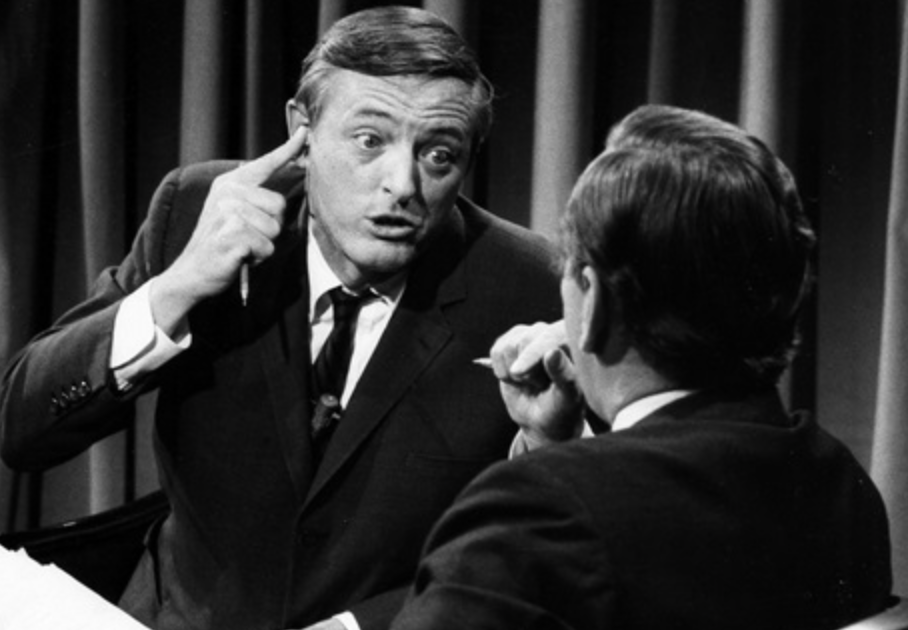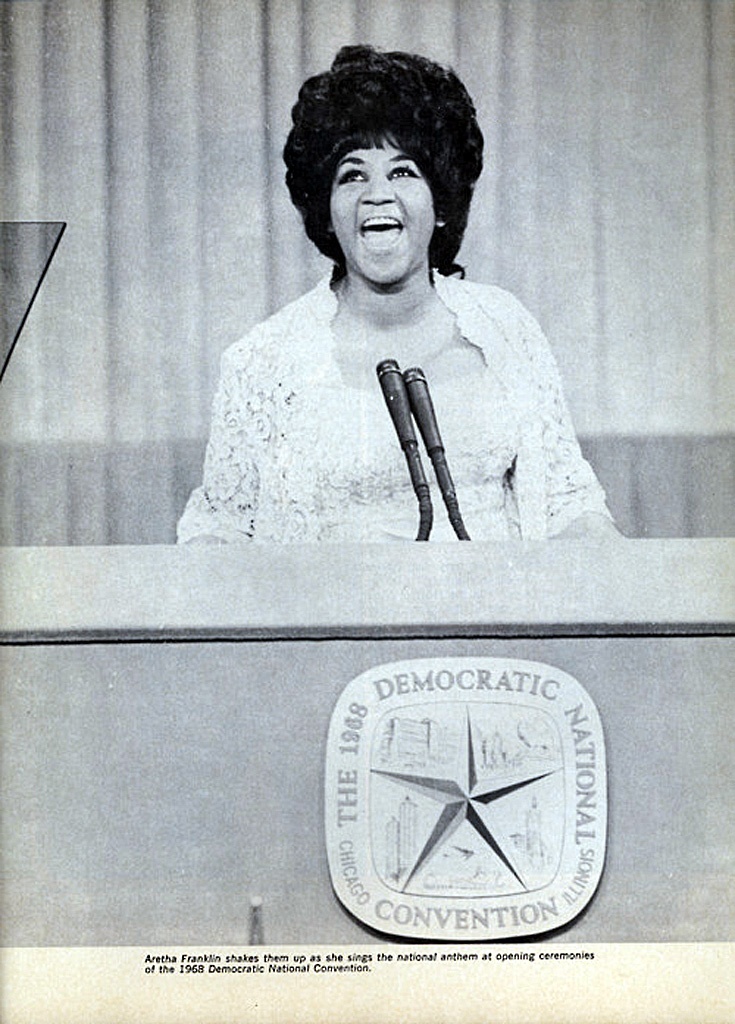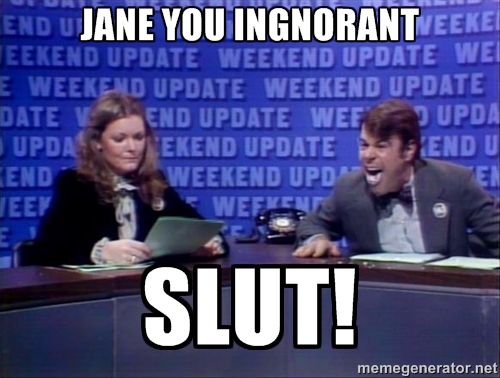 If it’s hard to imagine that there once were only three television networks, it’s not hard to imagine that ratings were abysmal for their political coverage; disengagement has been the American Way for as long as this ’70s baby can recall. In 1968, even as public division around the Vietnam War reached its boiling point, ABC news executives were in such a panic about low audience numbers that they scheduled ten nightly televised debates between conservative commentator and National Review founder William F. Buckley Jr. and essayist and novelist Gore Vidal to dovetail with the Democratic and Republican conventions. In their documentary, “The Best of Enemies,” directors Morgan Neville and Robert Gordon take an eagle-eyed look at those legendary events, including the cultural climate that spawned them and their unfortunate legacy in contemporary public discourse.
If it’s hard to imagine that there once were only three television networks, it’s not hard to imagine that ratings were abysmal for their political coverage; disengagement has been the American Way for as long as this ’70s baby can recall. In 1968, even as public division around the Vietnam War reached its boiling point, ABC news executives were in such a panic about low audience numbers that they scheduled ten nightly televised debates between conservative commentator and National Review founder William F. Buckley Jr. and essayist and novelist Gore Vidal to dovetail with the Democratic and Republican conventions. In their documentary, “The Best of Enemies,” directors Morgan Neville and Robert Gordon take an eagle-eyed look at those legendary events, including the cultural climate that spawned them and their unfortunate legacy in contemporary public discourse.
Now heralded as the progenitor of modern conservatism, Buckley was a devout Catholic whose books included arguments that universities forced students to adopt liberalism and defenses of U.S. Senator Joseph McCarthy’s Un-American Activities Committee. Though oddly overlooked right now, public intellectual Vidal was a rabid atheist, a cousin of Jackie Kennedy, and an outspoken raconteur whose novels celebrated gender and sexual fluidity; his prescient Myra Breckinridge, about a man who becomes a woman and storms Hollywood, was such a massive bestseller that it was adapted into a movie starring Raquel Welch and Farrah Fawcett. Needless to say, Vidal made Buckley foam at the mouth. Vidal biographer Fred Kaplan and Buckley scholar Sam Tanenhaus provide ample color commentary here about the antipathy that simmered between the two pundits even before they entered the boxing ring at ABC.
 What’s particularly interesting is how similar Buckley and Vidal seem now. As NPR journalist Brooke Gladstone points out in the film, “This was a time when no one on TV’s name ended with a vowel.” It’s not just that both men were white, erudite one-percenters long before there was an official one percent; it’s that they wielded their cultural dominance with an unusual – and, in retrospect, unseemly – degree of gusto. With their owl eyes, large teeth, and patrician jaws, each pronounced their words with such a careful disdain that it was as if the consonants tasted terrible in their mouths. Their mutual hatred reads as the sharpest of sibling rivalry; it goes without saying that they knew exactly how to needle the other.
What’s particularly interesting is how similar Buckley and Vidal seem now. As NPR journalist Brooke Gladstone points out in the film, “This was a time when no one on TV’s name ended with a vowel.” It’s not just that both men were white, erudite one-percenters long before there was an official one percent; it’s that they wielded their cultural dominance with an unusual – and, in retrospect, unseemly – degree of gusto. With their owl eyes, large teeth, and patrician jaws, each pronounced their words with such a careful disdain that it was as if the consonants tasted terrible in their mouths. Their mutual hatred reads as the sharpest of sibling rivalry; it goes without saying that they knew exactly how to needle the other.
From the beginning, that bickering made for great television, though in today’s idiocracy it also would come off as insufferably prissy. Ostensibly they were debating the future of the country but, as is pointed out here, what they really were trying to prove was which of them was the better person. In cultural context provided by such talking heads as New York Magazine columnist Frank Rich and sociologist and political writer Todd Gitlin, we learn how Buckley and Vidal grokked the power and potential of television in a way few other intellectuals did.
The two sniped at each other in every round, with sexual snubs that could today be confused for Sam-and-Diane-style flirting. (When Vidal refused to utter the title of The National Review, Buckley lowered his lashes and said: “So the name won’t sully your lips?” The bisexual Vidal purred: “You’ll eat it first.”) But the 1968 debates now are remembered for a mere ten seconds. During the Republican convention, Vidal had bested Buckley by pelting him with inconsistencies in the latter man’s columns and speeches. For Chicago’s Democratic convention, Buckley came more prepared, launching into an admittedly well-constructed (though to my mind misguided) critique of the local agitators. Then Vidal called him “a crypto-Nazi” and Buckley lost his shit. Face contorted, he leaned in and hissed: “Now listen you queer, stop calling me a crypto-Nazi or I’ll sock you in your goddamn face and you’ll stay plastered.”
Gordon and Neville don’t back away from the significance of that moment. Not only do they replay it a few times but, in interviews with members of both camps, they highlight that Vidal was “smart enough of a tactician” to know he’d won the debate by making the other man lose his signature composure. Buckley knew it, too; in a Charlie Rose interview some thirty years later, we can see how the topic still makes him wildly uncomfortable. Needless to say, the ratings of that exchange were  insane in the membrane, and thus begat the modern template of point-counterpoint folly. Not for nothing do these filmmakers include Dan Aykroyd’s famous SNL line: “Jane, you ignorant slut!” in their footage of news shows subsequently modeled on those 1968 debates. We may not be able to have our style and substance when it comes to TV debates, but with its glamorous late-1960s backdrop (prepare yourself for a young Paul Newman and Aretha Franklin at the Chicago convention) and sure-footed analysis, this documentary definitely can.
insane in the membrane, and thus begat the modern template of point-counterpoint folly. Not for nothing do these filmmakers include Dan Aykroyd’s famous SNL line: “Jane, you ignorant slut!” in their footage of news shows subsequently modeled on those 1968 debates. We may not be able to have our style and substance when it comes to TV debates, but with its glamorous late-1960s backdrop (prepare yourself for a young Paul Newman and Aretha Franklin at the Chicago convention) and sure-footed analysis, this documentary definitely can.
This was originally published in Word and Film.
